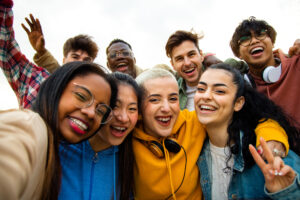Oct
14
Belonging in a World that Alienates
October 14, 2023 | | 1 Comment
“Do more than belong: participate. Do more than care: help. Do more than believe: practice. Do more than be fair: be kind. Do more than forgive: forget. Do more than dream: work.” – William Arthur Ward, motivational writer and poet.
The need to belong and the tendency to differentiate yourself from others is a normal part of human psychology; but I believe othering, from a societal to individual level, is much greater than what it should be. I think the way society determines who belongs impacts how we view others, because much of how we behave, what we like, and what we believe is based on societal norms of which we had no choice. From what we learn in school, how we govern, what media companies value, what is advertised, to the hierarchical economic structure, we are constantly influenced and told how to think.
We are trained by institutions to believe that there is an ideal “form” or type of human, and deviations of this are looked at negatively. This causes an “othering” that is harmful to communities with diversity, as groups become alienated and often dehumanized. No matter how kind or progressive you are, no one is immune to subconscious biases that are given to us, never to be corrected. It is often an uncomfortable topic to address because it is difficult to address one’s ignorance, but in times when communities are marginalized and hurt, pushing through uncomfortability is necessary. Some of my subconscious biases were unearthed when meeting my friends from Nepal. Never having learned about this country in depth, I had no way of knowing what they would be like and was surprised by the similarities in generational culture.
This sort of subconscious “outsider” bias is a pluralistic type of othering, because there was so much distant between me and this group of people from Nepal, my concept of them before we met was a reductive stereotype not based in reality. Without careful consideration, this sort of ignorance has the ability to alienate and dehumanize different cultures, abilities, sexualities, etc. On an international scale, it becomes an excuse for committing human rights violations by states. On an individual level, it can incite xenophobia and violence. The single “othering” we do is for obvious reasons more personal and targeted—you may know this person and think of them as “backwards” or not worth your understanding. I sometimes feel this way toward those that differ from me politically, as I often feel a strong reaction to this type of individual “othering”. I’ve found that it takes active self-awareness of one’s biases and stereotypes, getting out of your comfort zone, and stepping into spaces with a learning attitude not only of the experience of the “othered”, but your relation and role of “othering” that person. This allows you to see their perspective better, and even sympathize with them.
While the condition of the “other” is not ideal (at best), there is power in being an outsider. You experience the limitations of how society is organized and can advocate for normalization and accommodations. You’re able to see first-hand what must improve for a better society. If states were to prioritizes inclusion, we would be taught about groups that are different to us to dismantle stereotypes and create a stronger global community. And If the United States sought to help those we “other” in international politics instead of western countries that get the most spotlight, along with those we “other” within our own state, the world would be a more egalitarian, beneficial, and enjoyable place to live for all.

AMLE.org
Comments
1 Comment so far
Your writing is quite striking in its candid and personal exploration of the prompt. I really enjoyed your insights into the subconscious biases we form when interacting with unfamiliar cultures. What stood out to me the most is that through your writing, you are encouraging a shift from passive observation to active participation in breaking down our existing biases and stereotypes. I resonated with this greatly, and I do agree that change starts with our active recognition and self-awareness of the distinctions we have in our societies.